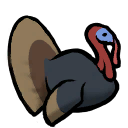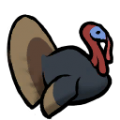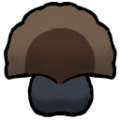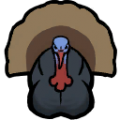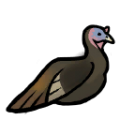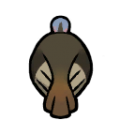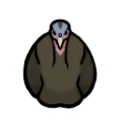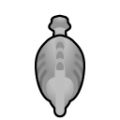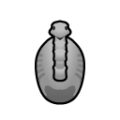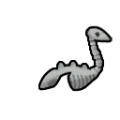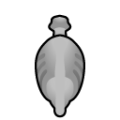Turkey
Turkey
A short, fat, flightless bird known for its hilarious 'gobbling' call. It has been long domesticated, but also lives in the wild.
Base Stats
- Type
- Animal
- Flammability
- 70%
Pawn Stats
- Combat Power
- 50
- Move Speed
- 3.6 c/s
- Health Scale
- 60% HP
- Body Size
- 0.6
- Mass - Baby
- 3.6 kg
- Mass - Juvenile
- 18 kg
- Mass - Adult
- 36 kg
- Carrying Capacity
- 45
- Filth Rate
- 6
- Hunger Rate
- 0.45 Nutrition/Day
- Diet
- herbivorous
- Life Expectancy
- 9 years
- Coastal Animal
- false
- Manhunter Chance
- 0%
- Manhunter Chance (Taming)
- 0%
- Trainable Intelligence
- None
- Wildness
- 45%
- Minimum Handling Skill
- 4
- Roam Interval
- 7 days
- Mate Interval
- 12 hours
- Maturity Age
- 0.2 years (12 days)
- Juvenile Age
- 0.12 years (7.2 days)
- Toxic Resistance
- 50%
- Toxic Environment Resistance
- 0%
- Comfortable Temp Range
- -8 °C – 40 °C (17.6 °F – 104 °F)
Production
- Meat Yield
 84 turkey meat
84 turkey meat- Leather Yield
 28 birdskin
28 birdskin- Eggs Per Clutch
- 1 to 1
- Egg Laying Interval
- 1.333 days
- Can Lay Unfertilized Eggs
- false
Melee Combat
- Attack 3
- Head
4 dmg (Blunt)
6 % AP
2 second cooldown
0.2 chance factor - Average DPS
- 2.0026
- tradeTags
- AnimalFarm, AnimalCommon
The turkey is a large bird that lays eggs. Adult male turkeys can be distinguished by a red head and neck, blue body, and a large fanned tail while females and babies of both genders are largely brown with a downwards angled tail.
Acquisition[edit]
Turkeys can be found in temperate forests, temperate swamps, boreal forests, cold bogs, and grasslands![]() . They can either be tamed by a handler or self-tame in a random event.
. They can either be tamed by a handler or self-tame in a random event.
Turkeys can be bought and sold in other faction bases, bulk goods traders or exotic goods traders. Turkeys purchased from traders will be already tamed.
Summary[edit]
Turkeys are pen animals. Once tamed, pen animals cannot and do not need to be trained any further. But if left outside of a pen or caravan hitching spot, pen animals will eventually roam outside your colony. Making a caravan is not required to tie animals to a caravan hitching spot.
A female turkey produces 1 turkey egg every 1.333 day when fertilized. Contrary to real life, RimWorld turkeys cannot lay unfertilized eggs.
Analysis[edit]
Turkeys are one of many egg-laying animals that are inferior to chickens. 2 hens eat less food and each hen lays 33% more eggs than 1 turkey. While chicken eggs are half as large, 2 chickens still lay more food per day. Hens do not need to be fertilized to lay eggs, which adds a further advantage. Ducks are slightly less nutritionally efficient than chickens, but are still superior to turkeys.
Many animals, such as horses, are strictly better when slaughtered for meat. But eating turkey eggs won't offend ideoligions![]() that forbid meat-eating. As such, they're decent if they you either want or need egg-layers and they are all you can find to tame, however you can typically find superior birds by the mid-game. Otherwise, you can hunt turkeys for early game meat, and they won't go manhunter on you.
that forbid meat-eating. As such, they're decent if they you either want or need egg-layers and they are all you can find to tame, however you can typically find superior birds by the mid-game. Otherwise, you can hunt turkeys for early game meat, and they won't go manhunter on you.
Nutrition[edit]
An adult turkey consumes 0.45 nutrition per day, and female turkeys produce 0.75 turkey eggs.
The optimal ratio of male : female turkeys is 1 male for every 1.78 female turkeys.
- When eaten as eggs, turkeys produce 0.375 nutrition of eggs per day.
- When slaughtered as babies, turkeys produce 0.478 nutrition of meat per day.
Attacks[edit]
Turkeys have three attacks: scratch (feet), bite (beak) and less commonly used, blunt (head). In addition to the base damage, the scratch and bite attacks apply a stun for 14 ticks (0.23 secs).
Training[edit]
This animal can be trained as follows:
| | |
| | |
| | |
| |
*As of version 1.1.2610, all animals can be tamed. The percentage of likelihood of success depends on factors such as the Animals Wildness Percentage, Pawn Handling Skill, and others. More information can be found on the animals page.
Health[edit]
The body part table is collapsed due to length. Expand to view.
| Part Name | Health | Quantity | Coverage[1] | Target Chance[2] | Subpart of | Internal | Capacity[3] | Effect if Destroyed/Removed |
|---|---|---|---|---|---|---|---|---|
| Body | 24 | 1 | 100% | 19% | N/A[4] | - | Death | |
| Tail | 6 | 1 | 10% | 10% | Body | - | - | |
| Spine | 15 | 1 | 5% | 5% | Body | Moving |
−100% Moving[5] | |
| Stomach | 12 | 1 | 4% | 4% | Body | Digestion |
−50% Digestion | |
| Heart | 9 | 1 | 3% | 3% | Body | Blood Pumping |
Death | |
| Lung | 9 | 2 | 4% | 4% | Body | Breathing |
−50% Breathing. Death if both lost. | |
| Kidney | 9 | 2 | 3% | 3% | Body | Blood Filtration | −50% Blood Filtration. Death if both lost. | |
| Liver | 12 | 1 | 5% | 5% | Body | Digestion |
−50% Digestion | |
| Neck | 15 | 1 | 20% | 5% | Body | Eating Talking Breathing |
Death | |
| Head | 15 | 1 | 75% | 3.1% | Neck | - | Death | |
| Skull | 15 | 1 | 30% | 1.8% | Head | - | Cannot be destroyed. Increasing Pain based on damage. | |
| Brain | 6 | 1 | 60% | 2.7% | Skull | Consciousness |
Death Damage always results in scarring. | |
| Eye | 6 | 2 | 12% | 1.8% | Head | Sight |
−25% Sight. −100% if both lost. Damage always results in scarring. 0% Hit Chance against Blunt damage. | |
| Beak | 12 | 1 | 25% | 3.8% | Head | Eating Talking Manipulation |
−100% Manipulation −90% Eating[6] | |
| Leg | 18 | 2 | 10% | 5% | Body | Moving |
−50% Moving. −100% if both lost. | |
| Foot | 15 | 2 | 50% | 5% | Leg | Moving |
−50% Moving. −100% if both lost. |
- ↑ Coverage determines the chance to hit this body part. It refers to the percentage of the super-part that this part covers, before its own sub-parts claim their own percentage. For example, if the base coverage of the super-part is 100%, and the coverage of the part is 20%, 20% of hits would hit the part, and 80% the super-part. If the part had its own sub-part with 50% coverage, the chances would be 10% sub-part, 10% part, 80% super part.
- ↑ Target Chance is the actual chance for each part to be be selected as the target when each part's coverage has been taken into account(I.E. Neck covers 7.5% of Torso but Head covers 80% of Neck so it actually has only a 1.5% chance to be selected). This is not pure hit chance, as different damage types propagate damage in different ways. See that page for details.
- ↑ Note that capacities can affect other capacities in turn. Only the primary effect is listed. See specific pages for details.
- ↑ This is the part that everything else connects to to be considered 'connected'.
- ↑ If Moving drops below 16% a pawn cannot move.
- ↑ Note that eating won't go below 10%.
Attack table
| Attack (Damage type) |
DPS[1] (Post Hit Chance)[2] |
Dam. | Cool. | AP | Selection chance[3] | |
|---|---|---|---|---|---|---|
| Average | 3.23 (2) |
- | - | 7.5% | - | |
| Feet (Scratch) |
3.33 (2.07) |
5 | 1.5s | 7% | 75% | |
| Beak (Bite) |
3 (1.86) |
6 | 2s | 9% | 25% | |
| Head (Blunt) |
2 (1.24) |
4 | 2s | 6% | 0% | |
- ↑ Note: This is the actual base average derived from the melee verb system updated in 1.1.2610, it may sometimes disagree with the listed value in the in-game infobox.
It may also change depending on the stats and the melee verbs available to the pawn. - ↑ Assuming a melee hit chance of 62%
- ↑ Chance for attack to be selected. It may change depending on the melee verbs available to the pawn.
Gallery[edit]
Version history[edit]
- 1.3.3066 -
